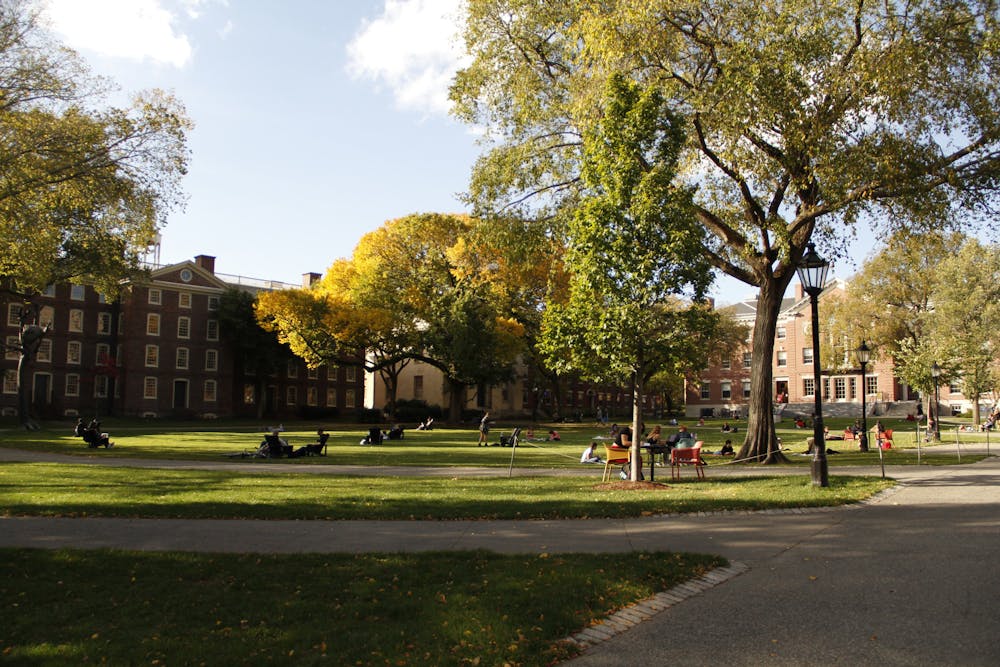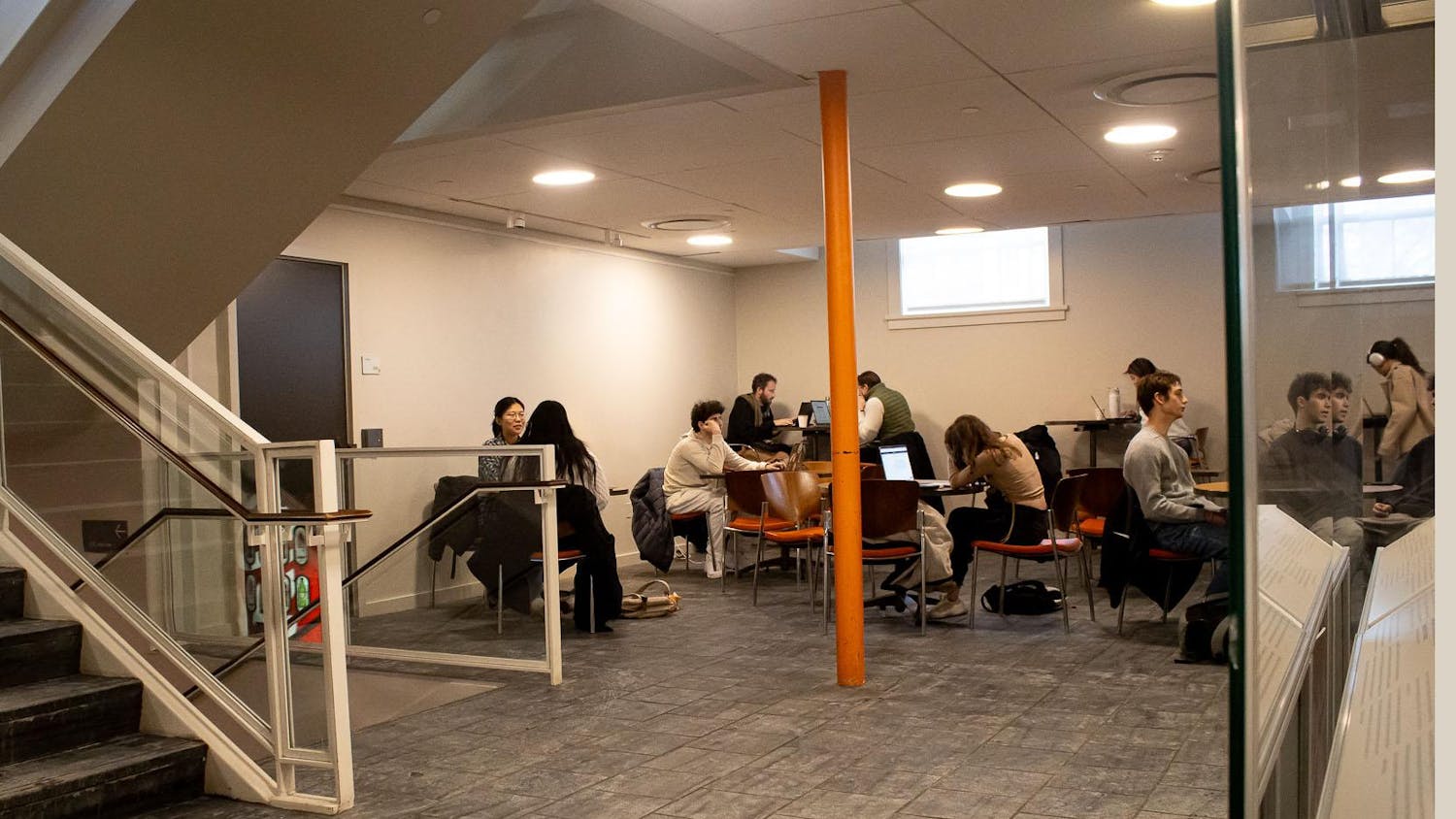One hundred sixty-five graduating seniors, 47 juniors and one graduating PhD student were elected to the University’s chapter of Phi Beta Kappa on May 21 and April 3 respectively, according to announcements from Coppélia Kahn, professor emerita of English and chapter secretary.
An academic honors organization, Phi Beta Kappa was founded in 1776 according to its website. Over the last two years, the University’s chapter — Rhode Island Alpha —has rolled out changes. The chapter previously rescinded the requirement that every “C” grade must be counteracted with an “A” grade and removed a condition stating that eligible juniors and seniors remain enrolled for consecutive semesters, The Herald previously reported.
According to Kahn, Rhode Island Alpha’s revised electoral process speaks to the chapter’s goal of electing 12% of the graduating class with the highest academic standing — 3% during their junior year, and 9% in their senior year. In the past, 10% of each graduating class was elected.
“We use the same measure of academic standing as the Registrar does when calculating magna cum laude honors,” Kahn explained. “The Executive Committee of the Alpha, consisting of five faculty or alumni who are officers of the society, conducts the election.”
“We have just completed the second year of running elections with these criteria, and we will be reviewing the results before going to our membership with a recommendation for making these criteria permanent,” she added.
To qualify for Phi Beta Kappa, at least 40% of a candidate’s course work must take place in the humanities, arts, social sciences, cognitive linguistic & psychological sciences or public health, Kahn said. Eligible seniors will have completed 28 courses with 23 grades of “A” or “S with Distinction” and eligible seniors will have completed 20 courses with 18 grades of “A” or “S with Distinction.”
The award “recognizes dedication to excellence over the span of a college career,” Kahn said. “Given the distribution requirement, it also represents achievement in a liberal arts and sciences curriculum, in a spectrum of fields, rather than a single one.”
When Carina Sandoval ’23 first received an email from Phi Beta Kappa, she was initially skeptical.
“I had never heard of Phi Beta Kappa until I had gotten the initial email saying that I had been accepted,” she said.
For Sandoval, her strongest points of pride and achievement at Brown were the contributions she made to the Providence and University communities through clubs and organizations.
“I remember going into my senior year and telling people that I didn't really want to pay attention to my academics this year” and that she would learn the most “from first-hand experience from the different organizations that I was involved in,” she said. “But now thinking back on it, I think that maybe it was because of this huge fear I had surrounding academia and whether or not I was the right fit for it.”
When she arrived at Brown from a public school in Chicago, Sandoval said she grappled with unrelenting imposter syndrome and feeling behind compared to her peers. She “didn’t really know anyone who had gone to college before,” she said.
“I very intentionally did not want to push myself academically or place much of my pride in school because I was so afraid of doing poorly and failing,” she said. “But then coming into classes, I just ended up trying so, so, so hard to get As, and I've slowly realized that I actually kind of enjoy academia.”
“So I guess this award is a bit of a representation of that,” she added. “An unexpected, but pleasant surprise.”
Amienne Spencer-Blume ’23 thinks of the honor “as a token of recognition and as putting a name to hard academic work.”
“What it means to me ranges from reminding me of many late work nights to emphasizing the gratitude I have for all those who have supported and believed in me before and during my time at Brown,” Spencer-Blume said. “Because receiving Phi Beta Kappa’s invitation was unexpected for me, what it means to me is also that interesting things can happen at unanticipated turns, simply by focusing on what is right in front of you, step by step.”
Still, Spencer-Blume noted that the honor “is a strong depiction of one slice of my engagement at Brown.”
“The membership criteria speaks on electives, non-native language skills, statistics, and good moral character, but doesn't mention service, for example,” she said. “I recognize Phi Beta Kappa as a unique honor, but there are non-academic achievements that are equally as integral to my and others’ time at Brown.”
Having grown up in Germany, Spencer-Blume said that she was not well-versed in the various honors and societies available in the United States to recognize academic excellence. But that unfamiliarity did not minimize the impact of the honor’s initiation ceremony.
“I was so moved by seeing so many of my peers in Solomon (Hall) on the day of the initiation ceremony. The thing I look forward to most when it comes to being a part of any kind of society is to find and build a caring and diverse community,” she said.
But other than the induction ceremony, Spencer-Blume said she wished that there were more “community building events” for the society. “That made me feel that Phi Beta Kappa is something that lives more on paper … which is a bit underwhelming given the amazing things that could be done if we came together and showed up for each other,” Spencer-Blume added. “I hope that by connecting with regional chapters, being a part of Phi Beta Kappa will be less about honor and more about engagement.”
Leona Hariharan ’23 noted that she felt the honor’s purpose remains somewhat unclear.
“I knew about Phi Beta Kappa and I knew it was prestigious, but I didn’t quite understand why,” Hariharan said. “I think it’s definitely interesting and I’m sure if you engage with it correctly, you can get a lot out of it.”
According to Kahn, “Phi Beta Kappa membership attracts attention on a résumé … for good reason.”
“But that’s not its only, or central, purpose,” she said. On top of offering access to fellowships, awards and other accolades across all disciplines, “life membership in Phi Beta Kappa means joining a community of scholars who respect and pursue broad learning and the critical thinking that goes with it.”
The following graduating students were elected to Phi Beta Kappa:
Ian Ackerman Parisa Afsharian
Alexander Avila
Anisha Baktha
Charlotte Balliett
Andres Beck-Ruiz
Robert Bellaire
Ford Bennett
Eliza Berman
Daniel Betensky
Aliyah Blattner
Josephine Bleakley
Alexandra Blitzer
Brehan Brady
Cyprene Caines
Caroline Callender
Thomas Castleman
Vanessa Chang
Julienne Chaqour
Katie Chen
Caroline Cheng
Samuel Clark
Kira Kelly Clarke
Lena Cohen
Claire Costa
Aurelia Cowan
Isabel Cox
Isabel Culver
Katherine Dario
Alexa De La Fuente
David Del Terzo
Grace Desmond
Jack Doughty
Katherine Dowling
Caroline Dressler
Simon Ehlinger
Patrick Faherty
Kelly Fan
Sierra Fang-Horvath
Alexander Fasseas
Gianna Finear
Olivia First
Benjamin Fiske
Beatrice Flynn
Ryan Frant
Ben Frigon
Rachel Fuller
Yasmeen Gaber
Nicolás Gascón
Emma Golden
Caitlin Goldenberg
Armeen Golshan
Olivia Golubowski
Aaron Gruen
Katie Gu
Astoria Hall
Faith Hardy
Leona Hariharan
Elana Hausknecht
Zeke Hertz
Meredith Hilkert
Abigail Hogan
Charles Holmes
Sarah Hoxha
Nicholas Huang
Jihwan Hwang
Brook Jaffe
Justen Joffe
Peyton Johnson
Clive Johnston
Jason Johnston
Chaelin Jung
Mina Kao
Anisha Kasi
Olwyn Kells
Melanie Kim
Brian Kim
Alison Kim
Jacob Kleinman
Sam Kolitch
Helene Koumans
Ethan Kuhl
Zoe Kupetz
Kyoko Leaman
Juliana Lederman
Amanda Levy
Jiawen Li
Matthew Lichtblau
Michal Loren
Paul Luniewski
Madison Mandell
John Maragakis
Charlotte Marcil
Abigail Marks
Cecilia Martin Garcia
Morgan McCordick
Jessa Mellea
Martin Menz
Gabriel Merkel
Alyssa Merritt
Laurel Meshnick
Felix Montgomery
Meghan Murphy
Yohan Mutta
Hyunjoon Nam
Caroline Nash
Dora Nathans
Catherine Nelli
Hai Ning Ng
Stella Ng
Zach Ngin
Stephen O'Donnell
Hannah O'Keeffe
Colin Olson
Ezenna Onuoha
Niyoshi Parekh
Shee-Yeon Park
Olivia Pavin
Srinaath Perangur
Julia Pierce
Noah Pirani
Benjamin Pollard
Vandana Ramesh
Jiawei Ren
Lucas Robles Capovila
Aila K. Rodriguez
Chloe Rosenkranz
Neil Rupani
Michelle Sahai
Shilpa Sajja
Thin Su San
Carina Sandoval
Atessa Savitt
Peder Schaefer
Gail Schor
Maxine Schulte
Richard Shen
Brian Showalter
Anson Shyu
Daniel Silverston
Hugo Skarstedt
Austin Smith
Isaac Sonnenfeldt
Amienne Spencer-Blume
Autumn-Jade Stoner
Diane Story
Joshua Tan
Susan Tang
Maya Taylor
Nina Theisen
Riley Thompson
Lucia Tian
Alejandro Torres
Daniel Tully
Matthew Walsh
Kelly Wang
Yiran Wang
Lily Ward-Diorio
Tucker Wilke
Galen Winsor
Nicole Wong
Isabella Yepes
Sheri Zhang
Jinshi Zheng
Albert Zhu
Benjamin Zimmerman
The following students who have not yet completed their degrees were elected:
Jody Aguirre
Ifenna Amaefuna
Sidharth Anand
Camille Aquino
Miriam Arden
Filbert Aung
Rebecca Bowers
Alana Cho
Angelina Cho
Zane Darden
Meehir Dixit
Johann Dizon
Elisa Dong
Corey Gelb-Bicknell
Adam Gendreau
Isaiah Goldsmith
Kait Gosakti
Brendan Ho
Shazain Khan
Sanjana Konda
Artem Kyrylov
Evelyn Lai
James Langan
Simon Leek
Rosella Liu
Alyssa Loo
Josie Miller
Min Namgung
Neha Narayan
Bryce Okihiro
Arushi Parekh
Aut Permpredanun
Harper Robbins
Ryan Sawyer
Emily Schweiss
Nathaniel Scott
Isabelle Sharon
Annie Stein
Ryan Urato
Jane Vaillant
Emma Venarde
Nate White
Colin Wire
Jada Wooten
Celina Ye
Emily Ye
Jasper Yeh
Tate Kihara PhD’23 was elected to the chapter’s graduate membership.

Sofia Barnett is a University News editor overseeing the faculty and higher education beat. She is a junior from Texas studying history and English nonfiction and enjoys freelancing in her free time.





